人教版book5 unit2 the united kingdom grammar 教师版
- 格式:doc
- 大小:77.50 KB
- 文档页数:4
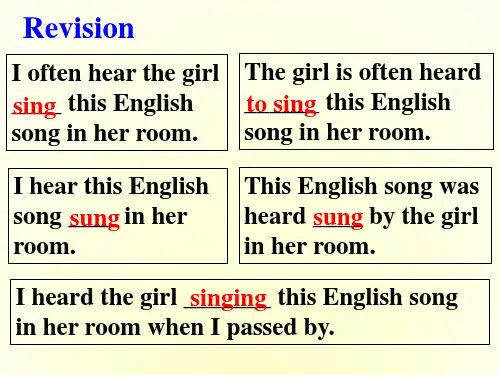
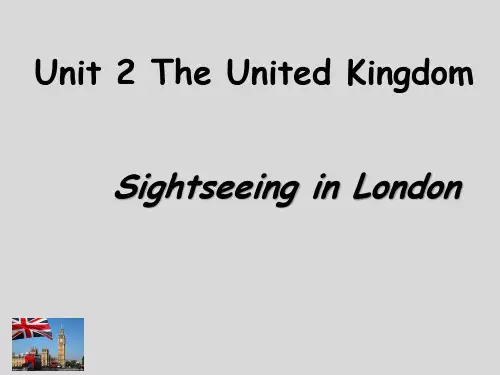
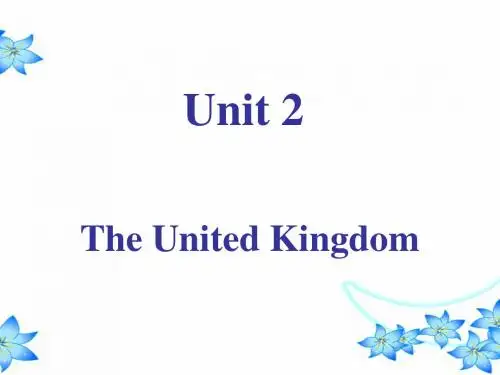

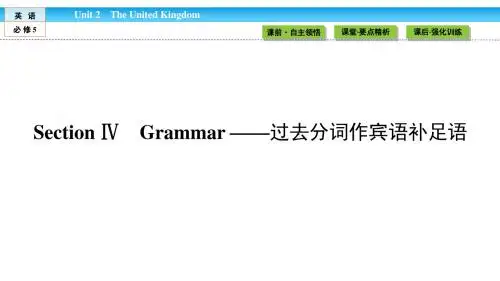

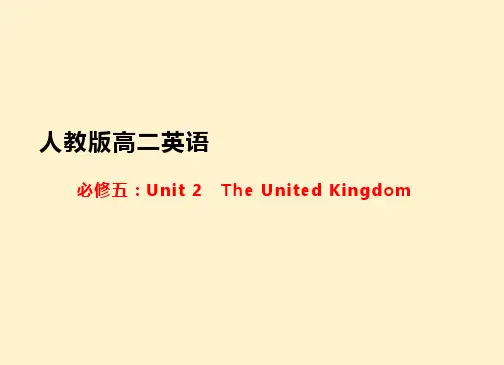
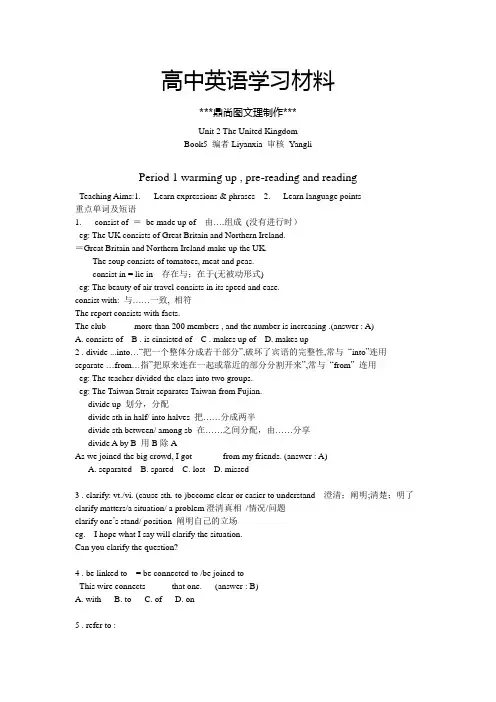
高中英语学习材料***鼎尚图文理制作***Unit 2 The United KingdomBook5 编者Liyanxia 审核YangliPeriod 1 warming up , pre-reading and readingTeaching Aims:1. Learn expressions & phrases 2. Learn language points重点单词及短语1. consist of =be made up of 由….组成(没有进行时)eg: The UK consists of Great Britain and Northern Ireland.=Great Britain and Northern Ireland make up the UK.The soup consists of tomatoes, meat and peas.consist in = lie in 存在与;在于(无被动形式)eg: The beauty of air travel consists in its speed and ease.consist with: 与……一致, 相符The report consists with facts.The club ______more than 200 members , and the number is increasing .(answer : A)A. consists of B . is cinsisted of C . makes up of D. makes up2 . divide ...into…“把一个整体分成若干部分”,破坏了宾语的完整性,常与“into”连用separate …from…指”把原来连在一起或靠近的部分分割开来”,常与“from”连用eg: The teacher divided the class into two groups.eg: The Taiwan Strait separates Taiwan from Fujian.divide up 划分,分配divide sth in half/ into halves 把……分成两半divide sth between/ among sb 在……之间分配,由……分享divide A by B 用B除AAs we joined the big crowd, I got ______ from my friends. (answer : A)A. separatedB. sparedC. lostD. missed3 . clarify: vt./vi. (cause sth. to )become clear or easier to understand 澄清;阐明;清楚;明了clarify matters/a situation/ a problem澄清真相/情况/问题clarify one’s stand/ position 阐明自己的立场eg. I hope what I say will clarify the situation.Can you clarify the question?4 . be linked to = be connected to /be joined toThis wire connects _____ that one. (answer : B)A. withB. toC. ofD. on5 . refer to :1) 提及,指的是…eg: When he said “some students”, do you think he was referring to us?2) 参考;查阅;询问eg: If you don’t understand a word you may refer to your dictionaries.Please refer to the last page of the book for answers.3) 关系到;关乎eg: What I have to say refers to all of you.This rule refers to everyone.It was foolish of him to _____ his notes during that important test, and as a result, he got punished.(answer : B)A. stick toB. refer toC. keep toD. point toreference: n. reference book6. accomplish vt.完成;达到;实现辨析:accomplish,complete,finish,achieveaccomplish 常接task,aim,journey,voyage等名词,有时兼有“达成(效果)”之意。
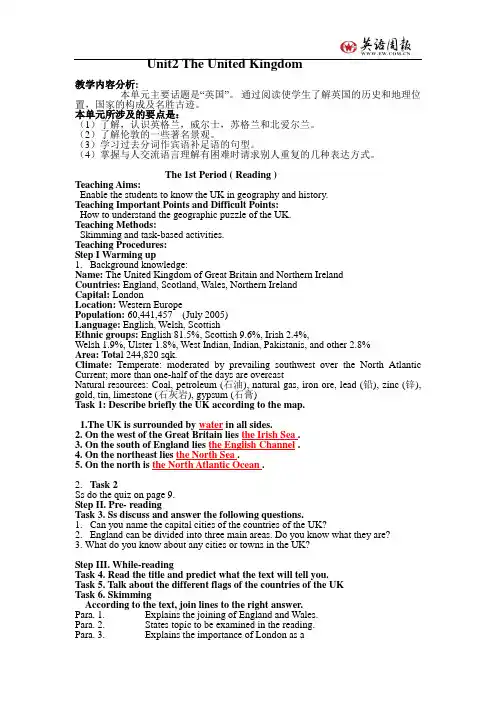
Unit2 The United Kingdom教学内容分析:本单元主要话题是“英国”。
通过阅读使学生了解英国的历史和地理位置,国家的构成及名胜古迹。
本单元所涉及的要点是:(1)了解,认识英格兰,威尔士,苏格兰和北爱尔兰。
(2)了解伦敦的一些著名景观。
(3)学习过去分词作宾语补足语的句型。
(4)掌握与人交流语言理解有困难时请求别人重复的几种表达方式。
The 1st Period ( Reading )Teaching Aims:Enable the students to know the UK in geography and history.Teaching Important Points and Difficult Points:How to understand the geographic puzzle of the UK.Teaching Methods:Skimming and task-based activities.Teaching Procedures:Step I Warming up1.Background knowledge:Name: The United Kingdom of Great Britain and Northern IrelandCountries:England, Scotland, Wales, Northern IrelandCapital: LondonLocation: Western EuropePopulation: 60,441,457 (July 2005)Language: English, Welsh, ScottishEthnic groups: English 81.5%, Scottish 9.6%, Irish 2.4%,Welsh 1.9%, Ulster 1.8%, West Indian, Indian, Pakistanis, and other 2.8%Area: Tota l 244,820 sqk.Climate: Temperate: moderated by prevailing southwest over the North Atlantic Current; more than one-half of the days are overcastNatural resources: Coal, petroleum (石油), natural gas, iron ore, lead (铅), zinc (锌), gold, tin, limestone (石灰岩), gypsum (石膏)Task 1: Describe briefly the UK according to the map.1.The UK is surrounded by water in all sides.2. On the west of the Great Britain lies the Irish Sea .3. On the south of England lies the English Channel .4. On the northeast lies the North Sea .5. On the north is the North Atlantic Ocean .2.Task 2Ss do the quiz on page 9.Step II.Pre- readingTask 3. Ss discuss and answer the following questions.1.Can you name the capital cities of the countries of the UK?2.England can be divided into three main areas. Do you know what they are?3. What do you know about any cities or towns in the UK?Step III. While-readingTask 4. Read the title and predict what the text will tell you.Task 5. Talk about the different flags of the countries of the UKTask 6. SkimmingAccording to the text, join lines to the right answer.Para. 1. Explains the joining of England and Wales.Para. 2. States topic to be examined in the reading.Para. 3. Explains the importance of London as acultural and political centre in the UK.Para. 4. Explains what the term “Great Britain”means and how it came about.Para. 5. Explains differences in the four countries.Para. 6. Explains how England is divided into threezones.Task 7. Answer the questions1. The Union Jack flag unites the three flags of three countriesin the United Kingdom. Which country is left out? Why?__________________________________________________2. What three countries does British Airways represent?1.________2. ________3. __________3. Which group of invaders did not influence London?________________________________________________Task 8. Ss read and get the general idea of the partsStep IV. After-readingWrite a short summary of the passage.The writer examines how the UK developed as an administrative unit. It shows how England is also divided into 3 zones. It explains why London became the cultural capital of England.Step VI. Homework assignment1. Read the whole passage and retell.2. Go to the net to get more information about UK.The 2nd Period (Language points) Teaching Aims:1.Learn expressions & phrases2.Learn language pointsTeaching Important Points:Language pointsTeaching Difficult Points:Have /get sth. DoneTeaching Methods:Presentation & PracticeTeaching Procedures:Step I RevisionRetell the passage.Step II. Expressions & phrasesExpressions & phrases (1)1.consist of 由…组成2.divided into 分开3.There is no need (for sb.) to do…4.debate about sth. 为…争辩(争论)5.refer to 提及,谈到6.connect to /link to 连接7.as well (as ) 也,还有8.to one’s (great) surprise 使…吃惊9.find sb./ sth. done (doing) 发现某人(物)处于某种状态下10.get sb. / sth. done11. break away (from) 挣脱12. break down (机器、车辆)坏13. for convenience 为了方便14. be known as/ for /to /by15.keep one’s eyes open 睁大眼睛16.make sth. worthwhile 使… 值得17.leave out 省去;遗漏;不考虑18. find out 发现19. on the phone 在电话里20. be on holiday 在度假21. in memory of 为了纪念22. leave for 动身去某地23. ring out 发出响声,响起24. make a list of 列出…的清单25. pass through 通过26. be on show 在展出27. take the place of 代替,取代28. remain doing 仍然在做…29. on (special) occasions 在(特殊)场合30. feel / be proud of 为…而自豪31. fall asleep 睡觉Step nguage Points1.consist of =be made up of 由….组成(没有进行时)eg: The UK consists of Great Britain and NorthernIreland.=Great Britain and Northern Ireland make up the UK.The soup consists of tomatoes, meat and peas.consist in = lie in 存在与;在于(无被动形式)eg: The beauty of air travel consists in its speedand ease.consist with: 一致The report consists with facts.2. 区别:s eparate …from (把联合在一起或靠近的人或物分离出来)divide…into 把…分开(把整体分为若干部分)eg: The teacher divided the class into two groups.eg: The Taiwan Strait separates Taiwan from Fujian.➢As we joined the big crowd, I got ______ from my friends.A. separatedB. sparedC. lostD. missed3. There is no need to do sth 没必要做某事eg: There is no need for you to help him.There is no need to worry at all.4. debate about sth.eg. They debate about the proposal for three days.debate /argue/ quarrel5. clarify: vt./vi. (cause sth. to )become clear or easier to understand 澄清;阐明;清楚;明了eg. I hope what I say will clarify the situation.Can you clarify the question?6. be linked to = be connected to /be joined to➢This wire connects _____ that one.A. withB. toC. ofD. on7. refer to1)提及,指的是…eg: When he said “some students”, do you think hewas referring to us?2) 参考;查阅;询问eg: If you don’t understand a word you may refer toyour dictionaries.Please refer to the last page of the book foranswers.3) 关系到;关乎eg: What I have to say refers to all of you.This rule refers to everyone.➢It was foolish of him to _____ his notes during thatimportant test, and as a result, he got punished.A.stick toB. refer toC. keep toD. point toreference: n. reference book8. join A to B /link A to B 把A和B连接eg: The Channel Tunnel will join Britain to Europeby road.9. included /including10. name: n. v.11. to one’s surprise(prep)“to one’s +名词” 表“令某人…”常见的名词有“ delight, disappointment, enjoyment; astonishment 等eg: I discovered, to my horror, that the goods wereentirely unfit for sale.To John’s great relief they reached the house atlast.12. …found themselves united peacefully“find +宾语+宾补( adj; adv; v-ing; pp; 介词短语;不定式)”eg: A cook will be immediately fired if he is foundsmoking in the kitchen.You’ll find him easy to get along with.They found themselves trapped by the bush fire.When I woke up, I found myself in hospital.I called on him yesterday, but I found him out.13. get sth done =have sth done 使某事被做eg: I'll just get these dishes washed and then I'llcome.get + n. + to doget + n. + doingeg. You’ll get her to agree.l’ll get the car going.get done: 用于意想不到、突然或偶然发生,意为“被….”➢Be careful when you cross this very busy street.If not, you may _____ run over by a car.A. haveB. getC. becomeD. turn14. break away (from sb / sth) 脱离;破除…eg: It is not easy for him to break away from badhabits.The man broke away from his guards.break down (会谈)破裂,失败;(汽车等)出故障;(人的健康状况)变得恶劣;(情感)失控eg. His car broke down on the way to work thismorning.His health broke down under the pressure of work.He broke down and wept when he heard the news.Talks between the two countries have completelybroken down.区别:break in 闯入;打岔break off 中断,折断break into 闯入break out 爆发;发生break up 驱散;分散,拆散➢News reports say peace talks between the twocountries_____ with no agreement reached.A. have broken downB. have broken outC. have broken inD. have broken up15. as well as 不仅…而且; 既…又…eg: He is a teacher as well as a writer.The children as well as their father were seen playing football in the street.16. relation: 关系;亲戚eg. The cost of this project has no relation to the results.He is a close relation of mine.17. convenience: n.方便;便利We bought this house for its convenience.convenient: adj.be convenient to sb.➢come and see me whenever ___________.A.you are convenientB. you will be convenientC. it is convenient to youD. it will be convenient to you.18. be known as 作为…(身份)出名be known for 因…而出名be known to 为…所知be known by 根据… 得知eg: Fu Biao is known to everyone as a good actor.He was known for his frankness.19. attraction:un. 1). 吸引;引力cn. 2). 吸引人的东西;喜闻乐见的东西;精彩节目Eg. attraction of gravitation 重力He can’t resist the attraction of the sea on a hot day.A big city offers many and varied attractions.What are the principle attractions this evening? attract : v.attractive: adj.unattractive: adj.attractively: adv.20. influence1)(v) 对…产生影响eg: What influence you to choose a career in teaching?2) (可数n) 产生影响的人或事eg: He is one of the good influences in the school. 3) (不可数n) 影响eg: A teacher has great influence over his pupils. 21. invader: n. 入侵者;侵略者invade: vt. 侵入;侵略;挤满;涌入eg. Doubts invade my mind.Disease invades the body.22. evidence (不可数n) 证据;迹象a piece of evidence 一项证据eg: He got many pieces of evidence from the internet for his theory.evidence: 指谋事的真伪proof: 指令人信服的、无可置疑的证据There wasn’t enough ________ to prove him guilty. His fingerprints were ________of his guilt.23. keep one’s eyes open 睁大双眼24. Which country is left out?*leave out: 省略;遗漏;排除eg: Do you know which word in this sentence has been left out?Don’t leave me out when you’re giving out theinvitations!25. take the place of 取代,代替=take one’s place / replacein place ofinstead of insteadgive place to 让位于…in place / out of place 在适当/ 错误的位置a place of interestStep VI Homework assignmentThe 3rd Period (Learning about language & reading) Teaching Aims:1.Enable the students to plan a tour around certain places.2.Help the students know more about the historical sites in London.Teaching Important Points and Difficult Points:Help the students identify different kinds of tour and talk about the most interesting place for the tour.Teaching Methods:Task-based activities.Teaching Procedures:Step I. Discovering useful words and expressions1.Ss do Ex 1 on page 11.2.Ss finish Ex 2 on page 12.Suggested answer:1.debate, puzzle, conveniences, clarify, legal, kingdom, attraction, influence2. whispered, asked, smiled, screamed, begged, agreed, answered, shouted,complained, suggested, decided, advisedStep II. ReadingTask 1: Read and answer the following questions.1.How did Zhang Pingyu plan her tour?2.What were the buildings mentioned in the text?What were they famous for? Who built them?What happened to them?Keys:1. First, she made a list of the sites she wanted to see. Then she planed her four-daytrip.2.1).Tower, built by Norman invaders of AD 1066, it is aSolid, stone, square tower which remained standingfor one thousand years.2). St Paul’s Cathedral, built after the terrible fire ofLondon in 1666, looked splendid;3). Westminster Abbey, contains statues in memoryof dead poets and writers;4). Greenwich, the longitude line;5). Big Ben;6). Highgate Cemetery;7). The library of the British Museum8). Windsor CastleTask 2: Read and fill the information in the form.Day 1Comments Day 2 andDay 3 and commentcomment1. Tower1. delight Greenwich with: ships Longitude line clock (GMT) Karl Marx’s statue “str ange he lived and died in London” British Museum “thrilled to see Chinese pottery”2. St Paul’s cathedral 2.splendid3. Westminster Abbey 3. interesting, full of statues of poets and writers4. Big Ben 4. famous and very loudStep III. Language points 1. available: adj. (物) 可用的,可得到的 (人)可会见的,可与之交谈的 eg. These tickets are available today. The doctor are available now. be available for 有空做…;可供…利用 2. make a list of 列…的清单 3. delight :n. 高兴,愉快 v. 给人乐趣,使愉快; 引以为了 eg. He laughed with delight. I was delighted to be invited to her party. She delights in cooking. delighted: adj. 高兴的 delightful: adj. 令人喜悦的,令人快乐的 be/feel delighted at/with/by 因…而高兴 to one’s delight /joy 令人高兴的是… 4. remain doing sth remain: 1).vi. 剩下;留下; 2). Link-v. continue to be 继续保持,仍然 Much work remained to be done. I’ll remain to see the end of the match. The door remained closed. It remained raining. 5. on special occasions 在特殊场合 6. in memory of … 纪念… eg: He founded the charity in memory of his late wife. 7. ring out: 发出响声,响起 8. It seemed strange that …should have lived… He seems to be … There seems to be …. 9. feel proud of Step IV . Homework assignmentThe 4th Period (Grammar )Teaching Aims:Enable the students to use the past participle as the object complement.Teaching Important Points and Difficult Points:Learn to use the past participle as the object complement.Teaching Methods:Task-based activities.Teaching Procedures:Step I. lead-inTask 1: Ss try to analyse the following sentences1.I think the job easy.2.We make him monitor.3.I saw a boy crying over there.4.We heard someone go into the room.5.My mother allows me to watch TV after I finish my homework.Step II. Grammar: The Past Participle as the Object ComplementTask 2: Try to find the function of the italic words.1.So many thousands of terrified people died.2.The polluted water was to blame.3.He became inspired when he thought about helping ordinary people.4.He got interested in the second theory.5.She found the door broken in when she came back.6.He kept the door locked for a long time.7.I have my hair cut.Task 3: Please find the sentences from the text with past participles used as the object complement.1.Now, when anyone refers to England you find Wales included as well.2.So to their surprise the three countries found themselves united…3.…they were going to get Ireland connected to the other three….Step III. PracticeTask 4: PracticeSs finish the Ex 2 on page 12.Suggested answers:1.have got the house mended2.have you had your hair cut?3.have the dictionary delivered4.haven’t had the film developed5.found it closed6.put it repaired7.got all their money stolen8.had some flowers sent, had it announced, had it organizedStep IV. SummaryTask 5: Summary:Past participle used as the object complementSs use the following words to make up sentences with past participles as the object complement and summarize the structures.1.keep the door ( lock);leave the window (break )I will keep the door locked when I leave my room.Don’t leave the window broken like this all the time.✧keep /leave + n. /pron. + p.p2. have the bike (repair);get the work (do);I have had my bike repaired.We had better work harder to get the work done on time.✧have /get + n. /pron. + p.p3. make yourself (hear);make myself (understand)Can you raised your voice to make yourself heard?I managed to make myself understood.✧make + oneself + p.p4. see the door (lock);hear the windows (beat)When we got to the shop, we saw the door locked.We can hear the windows beaten by the heavy rain drops.✧感官动词:watch/ notice/ see/ hear/ listen to/ feel /find 等+ n. /pron. + p.p5. with his hands (tie);with many flowers (plant) around the buildingThe thief was brought in with his hands tied behind his back.With many flowers planted around the building, his house looks like a beautiful garden.✧with + 宾语+ 宾补(pp/ -ing/adj. / adv./ to do…)Task 6: Practice1. Do Wb. Ex 1 on page 50.2. Do Ex 2. on page 51.Step V. Homework assignmentStep IV. Homework assignmentThe 5th Period (Listening & speaking)Teaching Aims:1.Improve the students’ listening skills.2.Improve the students’ speaking skills.Teaching Important Points:ListeningTeaching Difficult Points:Help Ss overcome the difficulties in listening material.Teaching Methods:Task-based activities.Teaching Procedures:Step I. Pre-listeningShow the Ss a map about the relations of the Kings.King Edward IV 1457-1483King Edward V 1486-1486King Richard III 1483-1485King Henry VII 1485-1509King Henry VIIIEdward VI Mary Elizabeth I1547-1553 1553-1558 1558-1603Step II. ListeningTask 1. Listen and finish Ex 1 on page 15.Task 2. Listen and fill in the blanks in the following passage.These two princes were _________and _______six hundred years ago. They had come to London for the older brother to be crowned _______after his father, King Edward IV,_____. He was only thirteen years old. His wicked uncle, Richard, was supposed to ___________them both, but instead he had them _______while they were_________.In the 1550s when queen Elizabeth I was still a___________, her sister, QueenMary, brought her to the Tower as a ________because she thought Elizabeth was a traitor. She ________through a special gate________ “Traitors Gate” . That only ___________to very bad people.Keys:Brothers, lived ,King, died, look after, killed, asleepPrincess, prisoner, went in, called, happenedTask 3 : Ss listen to the tape again and answer the questions on page 15.Step III. Speaking and Listening (page 48)The aim of this exercise is to show how history has affected those who can become British citizens.Task 4: Ss in groups discuss what kind of person can be British.The rules are fixed in this way:1. If your parents were born in the old British Empire and they chose to becomeBritish when that country gained independence, you are a British citizen. If your parents chose to become citizens of the new country, then you have to apply for British citizenship.2. If one of your parents is British and they were married at the time, you are a Britishcitizen.3. If you were born in the UK (even though your parents have a different nationality)you are a British citizen.4. If you have no connection with Britain (either through your parents or the countryyour were born in) but have lived in the UK for five years, you can apply to become a British citizen.Task 5: Ss listen to the tape and do Ex 2Task 6 : Ss listen again and fill in the following form on page 48.Group 1Group2Group 3Born in the old British Empire and asked to be aBritish citizen Having parents one of whomis British or having been born in the UK Asking to become British afterliving in the UK for five yearsStep IV. Homework assignment◆I beg your pardon? Pardon?◆What did you mean by…?◆I didn’t understand…◆I’m sorry but could you repeat that?Step II.WritingWritingTask 2: Ask the Ss to rewrite the sentence:The temple was build long ago.Ss work in groups of five. Each group has a sheet of paper. The first person write the sentence with one improvement (either a verb or an adjective.) pass it to the next person who keeps the first change and makes a second one. Then the third person does the same. And so on to the end of the team.Possible changes:•The old temple was built long ago.• The old temple was built two hundred years ago. • The old temple was constructed two hundred years ago. • The temple was burnt down early last century. • The temple was rebuilt in 1980’s. Task 3: Ss in groups write a guide book about an interesting building or attraction in your hometown. Writing tips: ➢ Ss look at the model on page 16. ➢ Ss make a writing plan. ➢ Ss collect the words they will use. ➢ Ss begin to write their guide book. ➢ Read through their guide book and correct the mistakes. ➢ Rewrite it again. The 6th Period (Reading , listening and speaking ) Teaching Aims: 1. Improve the students reading skills. 2. Learn something about Guy Fawkes Night. 3. Improve the students listening and speaking skill. Teaching Important Points and Difficult Points: 1. Reading Comprehension. 2. Talk about the history story about UK. Teaching Methods: Task-based activities. Teaching Procedures: Step I. Reading (page 51) Reading task Task 1: Ss read the passage and fill in the Timeline on page 52 October November10 Catesby asked Guy Fawkes to join a plot to blow up the government. 5 King James had the cellars searched when he heard of the plan. He found Fawkes 27 The two bought a house close to the Houses of Parliament6 Parliament was opened and there were celebrations because the plot had failed. 28-31 They stored gunpowder in the cellars for the next three days.Step II. Listening task (page 52) Task 2. Listen and finish Ex 1 on page 52. 1. King James was a Catholic. 2. King James was frightened of Catholic.3.King James supported Protestants.4.He punished Guy Fawkes.5.Guy Fawkes talked to King James.6. The king thought the Catholics wanted to kill him.7. The king rewarded Guy Fawkes.8. The king thought there were too few Catholics.9. The king’s friends abroad were Protestants.Keys: F, T, T, T, F, T, F, F, T.Task 3 : Ss listen again and answer the questions of Ex 2 on page 53Step III. Speaking taskDo you think Guy Fawkes or King James were right to behave the way they did? The purpose of this exercise is to help you understand the storyand then decide who you feel most sympathy for. There is no right or wrong answer.Discuss this problem in fours and make notes of your ideas. Then decide who gets your sympathy and give a reason.Reasons for King James’ action Reasons for Guy Fawkes’ action1.Fear at the number of Catholics 1.King James kept changing his mind2.Loyalty to the Catholic cause2.All friends on the Continent wereProtestant3.Worried Catholics might want to3.Believed what he was doing was right change the religion of EnglandStep IV. Homework assignment。
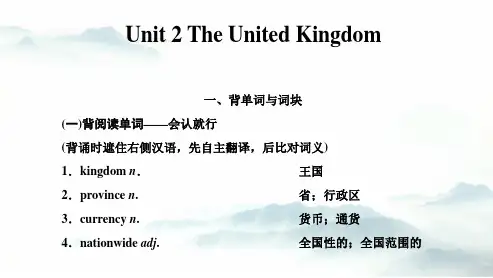
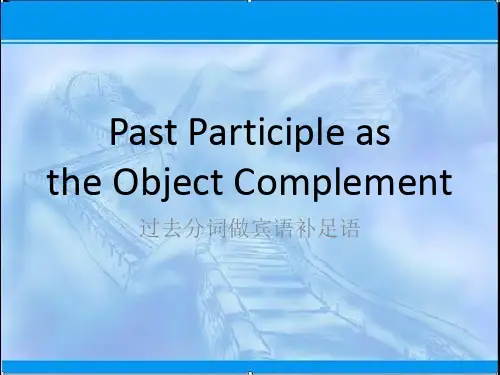
高二英语必修5Unit2 The United KingdomTeaching Goals:1. Get the students to know the information about the United Kingdom.2. Encourage the students to talk out what they know about the UK and Ireland.3. Help the students learn to get information by listening.Teaching methods1). Skimming & scanning methods to make the Ss get a good understanding of the text.1.Discussion methods to make the Ss understand what they’ve learned in class.2.Pair work of group to get every student to take part in the teaching-and-learningactivities.3.petition and role-play method to arouse the Ss’ interestTeaching proceduresStep 1 Warming up(1) What do you think of Dongguan? Which place impresses you most?(2) A. There are not many visiting places in Dongguan as it is a newly-developedcity. But what about our country? Think what words you¡¯ll need to describe a country and then give a brief description of China.B. There are many famous places in China. Think out one and describe it, lettingothers guess which place it is.2. Show pictures of some famous places of China. Ask: Where are they taken?3. Show pictures of some places of the British Isles and ask the students wherethey are taken. Then tell the students to say something they know about these places.4. (1) Ask the following question: Do you know how many parts the UK is made upof? (Scotland/ England/ Wales-----Britain + Northern Ireland-----the UK + the Republic of Ireland---- the British Isles)(2) Show the map of the British Isles to help the students to get a clear idea of some important cities in the UK and the names and the locations of different parts and counties and rivers.(3) Then ask the students to look at some cities in the UK and to name them.5. Group work:(1) What is the UK famous for? Think about sport, art, architecture, literature, film, food and life. (Show some famous examples.)(2) Talk about the geography, history, languages, culture, famous people, buildings and other things in the UK and Ireland.Step 2 Listening1. The teacher talks more about the languages in the UK and Ireland. Then ask the students to talk more about the education in the UK.2. Ask: How are classes arranged in schools in the UK?3. (1) Listen to the tape and tick the sentences which are true.(2) Listen to the tape and fill in the timetable below.(3) Listen to the tape and answer the following questions.Step 3 Extension1. Talk about our own timetable.2. Have a discussion about the similarities of the timetables in our country and the UK and also tell the differences between them.Step 4 HomeworkFind more information in relation to the UK and Ireland on the Internet.The second period SpeakingTeaching GoalsTrain the students¡¯ spoken EnglishImprove the students¡¯ ability of imagination and debatePractice expressing agreement and disagreementIncrease participation and learn from each other.Teaching ProceduresStep 1 Talking about hot topics1. The students are asked to listen to the 28th Olympic theme song and talk about the host city of Athens2. Talk about the 28th Olympic Games3. Talk about their favorite athletesStep2 Group theme debatesOf the talks about the country and Olympics above, lots of things are talked about like the opening ceremony, island, weather, language, geographic position, medals and so on.. The following three topics will be talked about . The students are divided into three groups and each will choose one of the topic boxes1. Box 1 Xiangsheng performance by the Chinese and the westerners. Is Chinese easy to learn for the westerners?2. Box 2 Learning different positions of England by moving different parts. Is it easier to learn geography by going there ?3. Box 3 Enjoying pictures of island or small countries like Iceland and Japan. Do island nations have advantages over other countries?Step3 Tips on how to express agreement and disagreementStep5 HomeworkPreview the reading passageThe third period ReadingTeaching goalsGet the students to know more about the British Isles and learn more new words and their usages.Teaching proceduresStep 1 PresentationShow the students four pictures and ask them to guess a country name which is related to all of them. ( The answer is the United Kingdom. )Ask the students: How much do you know about the united kingdom? Tell the students: Today we are going to read a passage about the British Isles.Step 2 Fast readingGet the students to skim the passage and match the paragraphs and the topics. Then let the students take a look at the map of the British Isles and tell me the place names of the different numbers on the map.Step 3 Careful readingAsk the students to read the passage carefully and decide whether the following sentences are true or false.( ) 1. Many people around the world study English, and they know a lot about British culture.( ) 2. Great Britain is made up of four countries.( ) 3. The island of Britain is separated from France by the English Channel. ( ) 4. Scotland is colder throughout the year, but receives less rain.( ) 5. People from different parts of northern Europe settled in England, so the culture of the people of the British Isles was influenced by them.( ) 6. The southern part of Ireland is now an independent republic.( ) 7. In modern time, people throughout the British Isles only speak English. Step 4 DiscussionShow the students some pictures of the three countries of the British Isles and then ask: If you have got the chance to visit one of the three countries of the British Isles, which country will you choose and why?Imagine that you are going on a four-week trip through the UK. Make a travel plan in which you describe where you go, how long you will stay and why, and what clothes and things you will take.Step 5 HomeworkWrite a short passage about the Dachen Isles.The fourth period Grammar and Language studyTeaching goals1. Learn about the appositive clause.2. Identify noun clauses.3. Enable students to use new words.Teaching proceduresStep 1 Review the vocabulary and plete the sentences.a. Students work in pairs first.b. The teacher check the answers.Step 2 Brainstorminga. Review the text and present the appositive clause by asking questions:1.What impresses you most in the passage ?The fact that ¡ impresses me most.2.What have you already known before reading the passage ?I have known the fac t that ¡3.Did you hear any news about Britain recently ?I heard the news that ¡b. Collect answers as many as possible ,reminding studentsof sentence structure if find errors.Step 3 Grammar Explanationa. Get students to identify the clauses .c. Try to make students tell the differences between appositive clause and attributive clause by paring the sentences.1.The news that the plane would take off on time made everybody happy.2.The news that is spreading around the airport is that a heavy storm is ing.3.The suggestion that students should learn something practical is worth considering.4.The suggestion that they are considering is that students should learn something practical.c. The teacher offers explanation if necessary.Step 4 Tell the function of the following sentences.1.The idea that Great Britain is made up of three countries¡¯ Corner ,Big Ben and the Tower of London is past.2.The fact that Great Britain is made up of three countries is still unknown to many.3.The result of so much French influence was that the English language ended up with many French words such as table, animal and age.4.Some people feel that Wales is an ancient fairy land.5.That most of these are now threatened and may disappear is a serious matter to the people in Britain.6.They realize that it is of great value to record and teach them to the younger generation.Step 5 ConsolidationConsolidate what have been learned by doing further exercises.The Fifth Period Integrative SkillsTeaching Goals:1. Learn to describe the countryside, the cities, the people and their life by reading the passage.2. Learn things about the city Salisbury.3. Know more about Britain.4. Cultivate the students’ abilities of concluding and reasoning.Teaching procedures:Step 1: Lead inTeacher plays the video clip from Robinson Crusoe and asks the students Have you ever seen this film?Who wrote the story?Do you know something about Daniel Defoe?Step 3 Extension1. More to know about life in Britain: When talking about life in England, we just can’t miss one thing---pub. Pubs play an important part in people’s lives. It is a good place to meet friends and talk and drink beers. English villages are small and cozy. Lots of pubs can be foundwith names like: the Red Lion, the Black Horse, the Rose and Crown, the King and Queen, and the George and Dragon. Lots of gorgeous food like pies, steaks, chips, big sandwiches, sausages and mash (potatoes!) and lots of different types of beer: bitter, lager (a light-colored beer), ale (a type of beer made from malt), etc!!!(A video clip is presented about a pub.)About football: Football is Britain’s national game. It was invented in Britain as far back as the 12th century, became an organized spectator sport in 19th century, and is now played in vast stadiums watched by tens of thousands of fervent supporters. Football is one of the few things that obsessed the British. And David Beckham is one of the most famous football stars. In the video we can see many college students playing football very early in the morning.2. Let the students say something about the British Isles as far as they know. Step 4 Homework:Now you know how to describe a city’s landscape, the people and their lives after reading this passage. And today’s homework:1. Choose any place you know or you like and write a short passage about it.2. With the help of the Internet, try to collect as much information as possible and make a PowerPoint presentation in the next period.。
矿产资源开发利用方案编写内容要求及审查大纲
矿产资源开发利用方案编写内容要求及《矿产资源开发利用方案》审查大纲一、概述
㈠矿区位置、隶属关系和企业性质。
如为改扩建矿山, 应说明矿山现状、
特点及存在的主要问题。
㈡编制依据
(1简述项目前期工作进展情况及与有关方面对项目的意向性协议情况。
(2 列出开发利用方案编制所依据的主要基础性资料的名称。
如经储量管理部门认定的矿区地质勘探报告、选矿试验报告、加工利用试验报告、工程地质初评资料、矿区水文资料和供水资料等。
对改、扩建矿山应有生产实际资料, 如矿山总平面现状图、矿床开拓系统图、采场现状图和主要采选设备清单等。
二、矿产品需求现状和预测
㈠该矿产在国内需求情况和市场供应情况
1、矿产品现状及加工利用趋向。
2、国内近、远期的需求量及主要销向预测。
㈡产品价格分析
1、国内矿产品价格现状。
2、矿产品价格稳定性及变化趋势。
三、矿产资源概况
㈠矿区总体概况
1、矿区总体规划情况。
2、矿区矿产资源概况。
3、该设计与矿区总体开发的关系。
㈡该设计项目的资源概况
1、矿床地质及构造特征。
2、矿床开采技术条件及水文地质条件。